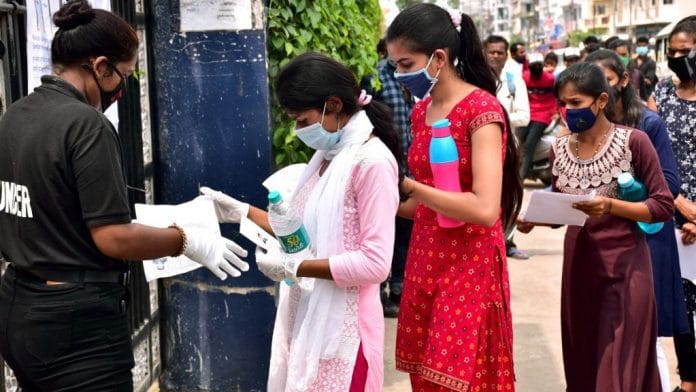New Delhi: A ‘credit mapping’ exercise has been undertaken by the Association of Indian Universities (AIU), a society that works as a mediator between universities and the government, to analyse academic credits across various countries and understand how they compare to the Indian system.
While it’s a fairly new term in Indian education, academic credits have been awarded by foreign universities — especially in the US, UK and the European Union — for a long time. A credit is a unit award gained by a student by the number of hours put in for a particular course.
For instance, in India, one credit is gained by 15 hours of classroom teaching or 30 hours of laboratory work or 30 hours including self-learning time (and classroom hours).
Credits in India are primarily awarded according to choice-based credit system (CBCS) developed by the University Grants Commission (UGC) and launched in 2015.
The aim behind the credit mapping report by AIU, according to officials, is to ease the process of degree equivalence.
At present, a one-year Master’s degree from a foreign university is not valid in India and does not meet the eligibility criteria for PhD enrollment. A Master’s degree in India is typically a two-year course.
With this report, however, AIU plans to make foreign degrees comparable in terms of credit and not the number of years studied, paving the way to make such degrees valid in the country.
“The credit mapping exercise has been undertaken so that we can understand how credits are awarded in various countries and how we can equate them with Indian credits and give validation to foreign degrees,” Pankaj Mittal, secretary-general of AIU, told ThePrint. Mittal was part of the committee, along with various academics, which prepared the credit mapping report.
Also read: Only 8 states and UTs have re-opened or want to reopen schools, govt tells Parliament
Report’s findings
Submitted in July, the report, stated, “A common benchmark needs to be developed for comparison of foreign academic degrees with that of India for granting equivalence.”
According to the report, accessed by ThePrint, for technical courses, under the All India Council for Technical Education (AICTE), 163 credits are required to be completed in 4,920 hours to get a four-year undergraduate degree.
Meanwhile, for three-year undergraduate programmes, approved by the UGC, 148 credits are required to be completed in 4,440 hours for an Honours degree and 132 credits to be completed in 3,960 hours for regular Bachelor’s degree.
Furthermore, the UGC has not laid down a specific number of credits for a postgraduate or a Master’s degree but the average credits required for a PG degree in IITs, NITs and other AICTE-approved colleges is 80.
The report compared the credits in India to those offered in other countries. It found that on average, India asks for about 40 to 49 credits a year (depending on the programme) that have to be completed in 1,200 to 1,400 hours.
In comparison, US universities ask for 30 credits a year in 1,350 hours, EU universities ask for 60 credits in 1,500 to 1,800 hours and universities in the UK seek 120 credits in 1,200 hours a year.
A one-year Master’s programme in the UK requires 180 credits that are completed in 1,800 hours.
After studying the credit system of US, UK, European countries, Australia, Afghanistan and Sri Lanka, the committee recommended that “foreign degrees having the same duration of academic program as that of India should be considered for equivalence provided other equivalence parameters are fulfilled”.
The report further noted that a Bachelor’s, Master’s or PhD degree awarded by a foreign university, which does not match the course duration in India, could be evaluated on the basis of minimum credits required to complete them.
However, it added, a 10 per cent relaxation in the number of credits could be given while evaluating based on the minimum number of credits.
“The education systems worldwide have undergone significant changes with emphasis on outcome-based learning, and choice-based credit system. The European, American, Australian, Canadian and many other universities in Asia now have provision for early completion of academic program provided the minimum number of credits required by the program are attained,” the committee report said.
(Edited by Rachel John)
Also read: Record 480 female students from J&K, 504 from NE get technical education scholarship in ‘20-21






